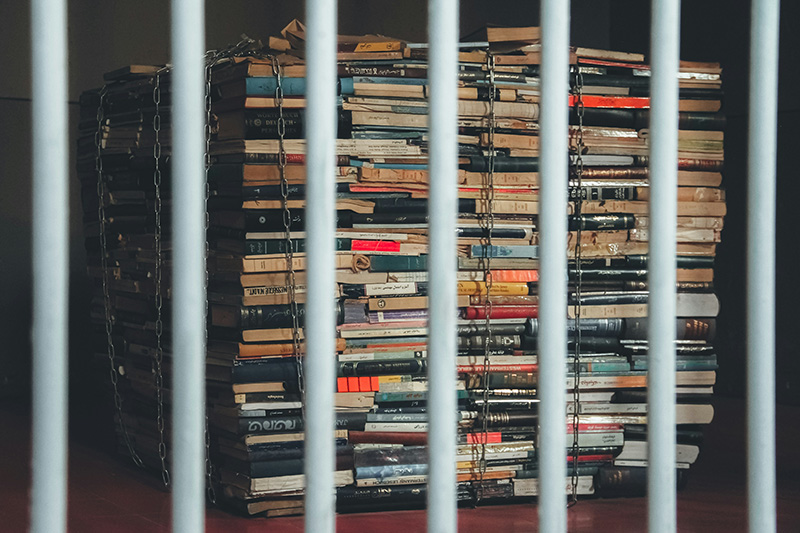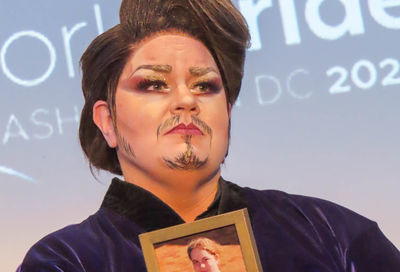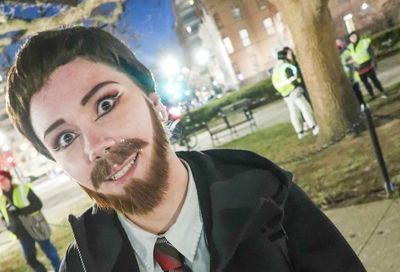Judge Blocks Texas County Ban on Library Books
A federal judge has ordered a Texas County that banned 12 books dealing with race and LGBTQ issues to return those books to library shelves.

A federal judge in Texas has ordered 12 books that were removed from the shelves of a county’s public libraries be made available to the public.
Officials in Llano County had removed the books that dealt with race, racism, sexual orientation, and gender identity from its three-branch public library system. They argued that the books were inappropriate for children.
But seven county residents filed a lawsuit in the U.S. District Court for the Western District of Texas, claiming that the books were removed because officials “disagree with the ideas within them.”
The lawsuit also claims that the county’s decision to terminate online access to thousands of digital books after being unable to ban two specific ones demonstrates censorship and violates the plaintiffs’ First and Fourteenth Amendment rights.
The removed books include Caste: The Origins of Our Discontents by Isabel Wilkerson, They Called Themselves the K.K.K.: The Birth of a American Terrorist Group by Susan Campbell Bartoletti, and Being Jazz: My Life as a (Transgender) Teen by Jazz Jennings.
The defendants in the case, which include Llano County Judge Ron Cunningham, four county commissioners, library system director Amber Milum and four members of the county’s library board, previously argued that the books were removed as part of a regular “weeding” process based on existing policies for determining whether material is age-appropriate.
Last Thursday, U.S. District Judge Robert Pitman, an appointee of former President Barack Obama, ruled in favor of the plaintiffs, ordering the censored books back onto library shelves within 24 hours.
He also ordered the library system to reflect those books as available in their catalog and barred the library from removing any other books for any reason while the case is ongoing.
“Although libraries are afforded great discretion for their selection and acquisition decisions, the First Amendment prohibits the removal of books from libraries based on either viewpoint or content discrimination,” Pitman wrote in his decision.
Pitman also found that the defendants’ decisions to purge 12 books appeared to be motivated by pressure from outside sources.
The library had received complaints from various community groups about multiple titles, which had been derided as “pornographic filth” for promoting the acceptance of LGBTQ views.
Still other books were flagged for dealing with “critical race theory” — a college-level form of analysis that examines how social conceptions of race and ethnicity have shaped laws, social and political movements, and media representation in the United States. Critical race theory has become another bogeyman for conservatives, in addition to LGBTQ visibility, in recent years.
For example, Bonnie Wallace, a member of the library board who is one of the current defendants in the case, wrote, prior to being elected to the board, that pastors should get involved and advocate for the banning of some books.
“Perhaps [the pastors] can organize a weekly prayer vigil on this specific issue,” Wallace wrote in one email. “May God protect our children from this FILTH.”
According to Pitman’s ruling, county commissioners also voted to dissolve the library board and replace it with a new “Library Advisory Board” that appointed multiple county residents, including Wallace, who advocated for book removals.
That advisory board required that all new books “be presented to and approved” by them before purchase, and barred staff librarians from attending the board’s meetings.
“Whether or not the books in fact qualified for ‘weeding’ under the library’s existing policies, there is no real question that the targeted review was directly prompted by complaints from patrons and county officials over the contents of these titles,” Pitman wrote in his ruling.
“And, notably, there is no evidence that any of the books were slated to be reviewed for weeding prior to the receipt of these complaints; to the contrary, many other books eligible for weeding based on the same factors appear to have remained on the shelves for many years.”
It remains unclear whether county officials have complied with Pitman’s ruling.
The case comes at a time when various school and library boards have sought to ban books from libraries and remove books they deem objectionable from school library shelves. Many of those efforts target LGBTQ-themed books or titles dealing with race or racism — even from a historical perspective — as well as books by LGBTQ authors or people of color.
Texas officials have sought to pull dozens of books from library shelves in the name of censoring materials they consider “pornography.” Multiple state legislatures have either drafted or passed bills to tighten restrictions on the availability of books in schools or public libraries. A Florida district placed advisory labels on 115 books in order to comply with the state’s “Don’t Say Gay” law. And Virginia conservatives have sought to declare some books “obscene” so as to have them removed from library shelves and prevent bookstores from selling them.
“This is a ringing victory for democracy,” Ellen Leonida, an attorney representing the plaintiffs in the Texas case, told CNN. “The government cannot tell citizens what they can or can’t read. Our nation was founded on the free exchange of ideas, and banning books you disagree with is a direct attack on our most basic liberties.”
Deborah Caldwell-Stone, director of American Library Association’s Office for Intellectual Freedom, noted in a statement that book challenges that seek to remove titles from shelves typically aim to suppress titles elevating the voices of minority or underrepresented communities.
“Each attempt to ban a book by one of these groups represents a direct attack on every person’s constitutionally protected right to freely choose what books to read and what ideas to explore,” Caldwell-Stone said. “The choice of what to read must be left to the reader or, in the case of children, to parents. That choice does not belong to self-appointed book police.”
Support Metro Weekly’s Journalism
These are challenging times for news organizations. And yet it’s crucial we stay active and provide vital resources and information to both our local readers and the world. So won’t you please take a moment and consider supporting Metro Weekly with a membership? For as little as $5 a month, you can help ensure Metro Weekly magazine and MetroWeekly.com remain free, viable resources as we provide the best, most diverse, culturally-resonant LGBTQ coverage in both the D.C. region and around the world. Memberships come with exclusive perks and discounts, your own personal digital delivery of each week’s magazine (and an archive), access to our Member's Lounge when it launches this fall, and exclusive members-only items like Metro Weekly Membership Mugs and Tote Bags! Check out all our membership levels here and please join us today!


























You must be logged in to post a comment.